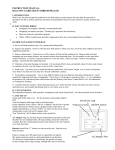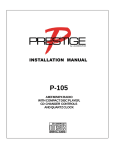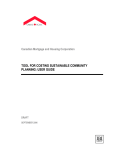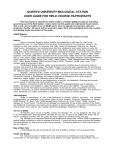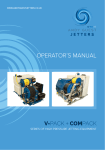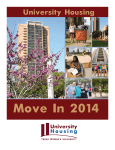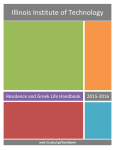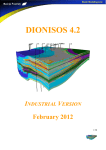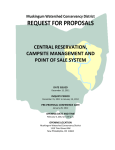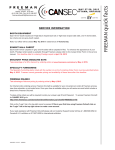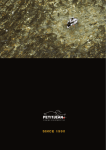Download QUEEN'S UNIVERSITY BIOLOGICAL STATION USER'S GUIDE
Transcript
QUEEN'S UNIVERSITY BIOLOGICAL STATION USER’S GUIDE FOR ELBOW LAKE Revised January 2014 This User’s Guide is intended to outline matters of safety, procedures and policy governing use of the Elbow Lake Environmental Education Centre (ELEEC) facility and surrounding lands protected as part of the Frontenac Arch Natural Area. Users must read this guide, and understand and abide by its provisions. It is the responsibility of all users to co-operate in ensuring a safe and productive facility. Failure to comply with the provisions of this guide may result in your eviction from the premises. An electronic version of this User’s Guide and other general information about the Queen’s University Biological Station (QUBS) are available on our websites at http://elbowlakecentre.ca and www.queensu.ca/qubs/index.html. CONTENTS 1.0 BACKGROUND ........................................................................................................................................................ 2 1.1 Property History and Current Use...................................................................................................................... 2 1.2 Administration ....................................................................................................................................................... 2 1.3 Reservations and Bookings ................................................................................................................................ 2 1.4 Maps of QUBS Facilities and Properties .......................................................................................................... 3 2.0 GENERAL INFORMATION – ELBOW LAKE ...................................................................................................... 3 2.1 Basic Services ...................................................................................................................................................... 3 2.2 Gates, Roads and Parking .................................................................................................................................. 4 2.3 Pets......................................................................................................................................................................... 4 2.4 Firewood ................................................................................................................................................................ 4 2.5 Conservation Property ......................................................................................................................................... 5 2.6 Smoking ................................................................................................................................................................. 5 2.7 Drinking Water ...................................................................................................................................................... 5 2.8 Disposal ................................................................................................................................................................. 5 2.9 Swimming .............................................................................................................................................................. 6 2.10 Boating ................................................................................................................................................................... 6 3.0 FACILITY RULES AND FACILITY AMENITIES .................................................................................................. 7 3.1 Rules of the Elbow Lake Environmental Education Centre ........................................................................... 7 3.2 What to Pack for Your Elbow Lake Visit ........................................................................................................... 8 4.0 HEALTH AND SAFETY........................................................................................................................................... 9 4.1 Telephones and 9-1-1 Emergency System ...................................................................................................... 9 4.2 Fire Safety and Emergency Fire Procedure ................................................................................................... 10 4.3 First Aid ................................................................................................................................................................ 10 4.4 Accident or Injury ................................................................................................................................................ 10 4.5 Day Camp Field Safety...................................................................................................................................... 10 1 1.0 BACKGROUND 1.1 Property History and Current Use Since 1945, the Queen’s University Biological Station has provided opportunities for university-level teaching and research in the biological sciences. Near the main site on Lake Opinicon, QUBS protects – either through direct ownership or in partnership with land trust organizations – over 8,300 hectares (3,300 acres) of land. Together, these properties form a significant conservation presence in the Rideau Lakes / Frontenac Axis area. Recently, QUBS has expanded the scope of its outreach programs, intended to involve the general public in activities at QUBS. Included in these programs are activities aimed at children and youth, particularly those visiting in a school group setting. The Elbow Lake property arose from a 2011 agreement between QUBS and the Nature Conservancy of Canada (NCC). While NCC is most interested in protection of the lands and constituent biodiversity of the 445 hectare (1100 acre) property that is part of the greater Frontenac Arch Natural Area, QUBS will use the existing infrastructure and diversity of the site to offer programming grounded in environmental research, natural history and conservation work done by scientists at Queen’s and other institutions, but aimed at a wider audience than just universities. Originally a corporate retreat of Hewlett-Packard employees, ELEEC – with its overnight cabins, a main lodge, a log cabin museum and other outbuildings, as well as waterfront facilities and marked hiking trails – is poised to become a significant public outreach site of QUBS. Since 2011, Eco-Adventure Camp has operated through the summer out of Elbow Lake. The focal age span of participants for this day camp is 9 to14 years. Eco-Adventure Camp stimulates campers’ interests in nature, biology, conservation and ecology in an outdoor setting that affords opportunities for swimming, hiking and canoeing. 1.2 Administration QUBS is administered as part of the Department of Biology, Queen's University. The cascade of responsibility for operations is as follows: Dean, Arts and Science; Chairman, Department of Biology; QUBS Director, Dr. Stephen Lougheed; and QUBS Associate Director, Dr. Shelley Arnott. The Director and site manager are responsible for day-to-day operation of the facility and collaborate on planning, reservations and all aspects of general operations. The QUBS Manager, based at the Opinicon Station is Mr. Frank Phelan and the ELEEC Manager, based at Elbow Lake is Mrs. Carolyn Bonta. Eco-Adventure Camp Director is Kait Pasic, who is responsible for the delivery of day camp programming through July and August, and for supervision of day camp counsellors. 1.3 Reservations and Bookings As the primary public outreach arm of QUBS, the ELEEC accepts both day use and overnight bookings by a variety of public groups, including elementary/secondary and post-secondary institutions, environmental / conservation partners, outdoor recreational clubs and student exchange groups. Capable of accommodating groups of up to 40 people for overnight use or for hosting larger day use groups, the centre offers a unique setting for academic and corporate retreats and private meetings year-round. 2 Any individual or group leader using ELEEC facilities is responsible for ensuring that all members of their party are familiar with the rules of the facility. Overnight users will be required to understand and acknowledge the User’s Agreement & Waiver. Rules of the ELEEC are listed under Section 3.1. Bookings for Elbow Lake are arranged by e-mail or telephone request to the ELEEC Manager; refer to the ELEEC website (elbowlakecentre.ca) for details, including pricing. The biological station at Opinicon Lake is primarily the academic arm of QUBS, hosting university teaching, research and field programs. Bookings are made as follows: • • University Research: Refer to the QUBS website (www.queensu.ca/qubs) for details, including procedures, pricing, policy and forms. University Teaching: Field courses are planned at the annual meeting of the Ontario Universities Program in Field Biology (OUPFB) in December. Proposals for OUPFB offerings should be sent to the Director or QUBS Manager in advance of this meeting to ensure that there is space at the facility. Proposals for field courses distinct from OUPFB modules should also be made to the Director or QUBS Manager. All bookings are subject to space limitations at both the Opinicon Station and at Elbow Lake. If your request for accommodation at one facility cannot be met, QUBS will seek to arrange accommodation at the other. Relevant safety planning and approval specific to the home institution of the lead organizer is also required for field courses. Registration information for Eco-Adventure Camp can be found at http://ecoadventurecamp.ca. Uses other than those outlined above may be permitted as long as they are consistent with the mandate of NCC and QUBS. Contact the Director or ELEEC Manager. 1.4 Maps of QUBS Facilities and Properties Maps detailing the Elbow Lake Environmental Education Centre facility and surrounding Frontenac Arch Natural Area property are available on the ELEEC website, while mapping and imagery of the greater QUBS landholdings can be found on the QUBS website. As we are in the process of updating our websites, we apologize that these resources may be temporarily unavailable. 2.0 GENERAL INFORMATION – ELBOW LAKE Detailed information on health and safety is provided in Section 4.0. 2.1 Basic Services Basic services (water supply, septic systems, electrical supply, heat, telephones etc.) are the direct responsibility of management. Please inform the ELEEC Manager of problems or concerns as they arise. With concern for the environment and energy conservation, one should make every effort to conserve resources by minimizing use of basic services. Do not waste water, electricity or heat and make sure that all appliances are turned off before you depart the facility. The following guidelines are posted as a reminder in each cabin: 3 Checking In • Use refrigerator only if absolutely necessary. You will need to plug it in. • IF NEEDED, turn electric heat on at breaker panel in closet and adjust individual room thermostats – use only as necessary and set as low as possible – electric heat is expensive! – do not use electric heat and have windows open. • Kitchen facilities and drinking water (Culligan jugs) are located in the Pavilion. We do not test the tap water so please use only for washing. 2.2 Checking Out • Turn off all lights, both inside and outside. • Close all windows. • Turn off breaker for electric heat at panel in closet (double-check that this is done!). • Take all foodstuffs with you – leave nothing behind! • Unplug refrigerator, and leave doors propped open (use ice tray). • Collect all your garbage – RECYCLE! • Notify management of deficiencies e.g., blown light bulbs, broken equipment, etc. • Clean countertops, table and floors. Gates, Roads and Parking Gates are to be left as they are found: Typically, gates are left open and unlocked while day use programming is occurring, closed but unlocked when overnight guests are on site, and closed and locked between use. The maximum speed on ELEEC roads is posted as 30 km/hr. The volume of traffic by users – children, pedestrians and bicyclists share these roadways – and by wildlife – e.g., basking snakes, nesting turtles – dictates that special caution and slower speeds be exercised. Operate all vehicles with utmost care. To guarantee access to all buildings, maintenance vehicles and emergency vehicles, never block roadways, laneways or access to any building. Park only within the designated parking areas. 2.3 Pets Dogs are allowed at Elbow Lake with permission of the ELEEC Manager. All dogs must be leashed while anywhere on the property – this includes all outdoor facilities and trails. For overnight users, only cabins #5 and #6 are designated for dogs. The inside of all other buildings is off-limits: do not bring your dog into the Pavilion (this is a public cooking facility), Nature Centre, or any cabin. For health reasons, please keep your dog out of the swimming area. No other pets are permitted at Elbow Lake. 2.4 Firewood The Co-ownership Agreement between NCC and Queen’s University directs that, to reduce the risk of invasive species introduction and dispersal, firewood may not be brought in from outside the property boundaries. Firewood for use at ELEEC is sourced from within the property for burning only in designated areas. Firewood is available for purchase by overnight users; if possible, please indicate the amount anticipated when booking your accommodation. If firewood is required during your visit, it may be purchased on-site from ELEEC staff. Firewood may not be removed from the property, meaning unused firewood may not be brought home with you, so do not buy more wood than you need. Fallen twigs and branches from 4 around the designated fire area may be collected for kindling, but larger deadfall is to be left in its natural state. The stone fire pit, located between the Pavilion and the Nature Centre, is the only designated area for campfires. This central area is shared among overnight users. 2.5 Conservation Property Beyond the developed area of the education centre, the Frontenac Arch Natural Area is owned by the Nature Conservancy of Canada and managed as a nature reserve. It is the intention to leave the natural features of the area undisturbed. When exploring the property, stay on the trails to minimize impact on the natural terrain. As with all nature reserves, motorized and mechanized vehicle use, camping and campfires are prohibited within the Frontenac Arch Natural Area. If you notice any damage, evidence of poaching or impending risk to these lands please notify QUBS management immediately. In recent years, the range of the Black-legged Tick (Ixodes scapularis) has spread to include the Frontenac Arch area, and can be found on all QUBS properties. This insect is the carrier of bacteria that can cause a very serious illness known as Lyme Disease. Learn how to recognize a Black-legged Tick and protect yourself from tick bites – always check for ticks after any visit to an area where ticks are known to occur. Know how to recognize and respond to symptoms of infection: See www.health.gov.on.ca/en/public/publications/disease/lyme.aspx for additional information. 2.6 Smoking For health and safety reasons, Queen's University is a smoke-free workplace. As a satellite campus, the Elbow Lake Environmental Education Centre is a smoke-free facility and smoking is not permitted at any time while on the property. 2.7 Drinking Water Water delivered to any fixture is not tested, so should be presumed unsafe – suitable for hand-washing, dish-washing and showering but not for regular consumption. Drinking water is provided only from the water cooler and large blue jugs in the Pavilion. 2.8 Disposal Water-borne disposal (toilets, sinks, showers) ends up in septic systems. These systems need to be treated gently! Do not dispose of non-biodegradable material, paper towels or cardboard in toilets – this includes feminine hygiene products and sanitary wipes – and never attempt to flush bulky items. No chemicals are to be disposed of in sinks or toilets. The garbage policy for overnight users to Elbow Lake is “pack-in/pack-out”, meaning that anything you bring in you must also take out; day users are strongly encouraged to support this policy as well. Waste bins in the Pavilion washrooms are intended for paper towel (which are burned on-site), but can accept small amounts of personal hygiene waste. ELEEC actively participates in local recycling programs (www.southfrontenac.net/en/livinghere/recycling.asp) and encourages all users to co-operate in this effort. Recyclables should be 5 separated from garbage, cleaned and sorted to the appropriate bin(s). The recycling depot is located in the Pavilion. Compostable materials should also be separated from garbage and placed in the appropriate container – vegetable matter only in the black cones, while the rotating drum can accept meat and fish. All compost containers are found outside the Pavilion. Composting is a good way to reduce the volume of waste destined for landfill sites and produces an ecologically valuable-end-product. Consult management if you are unsure of proper means of disposal of any waste. 2.9 Swimming Through summer, the designated swimming area at Elbow Lake is clearly outlined with floating buoys. Safety equipment in the form of throw rings and poles are in place at the beach and docks. Do not remove or play with safety equipment. All swimming by Eco-Adventure Camp participants must be done under lifeguard supervision. Observe the rules of the camp, as posted at the beach. Other than for the Eco-Adventure Camp, the beach at Elbow Lake is unsupervised – there are no lifeguards. Those who choose to swim in Elbow or Spectacle lakes do so at their own risk. There are inherent dangers in recreational swimming: be safe, recognize the hazards. 2.10 Boating As of 2013, Elbow Lake was free of Zebra Mussel (Dreissena polymorpha) and Spiny Water Flea (Bythotrephes longimanus). To reduce the risk of accidentally introducing these or other harmful invasive aquatic species, watercraft and boating equipment (e.g., paddles, PFDs) must not be brought into Elbow Lake from other locations without thorough cleaning and disinfection. Contact the ELEEC Manager to request permission to bring outside watercraft and equipment into Elbow or Spectacle lakes. At Elbow Lake, non-motorized watercraft (canoes, pedal-boats and kayaks) may be available for overnight guests and specified day user groups. Motorized gas-powered watercraft is not permitted on either Elbow or Spectacle lakes; contact the ELEEC Manager for permission to use electric-powered watercraft on Elbow Lake. The required safety gear is provided and must be in place at each use. Canoes are required, by law (http://www.tc.gc.ca/eng/marine-menu.htm), to carry an approved personal flotation device for each passenger, a set of paddles, 15 metres of buoyant heaving line, a bailer, a sound signalling device (whistle) and a watertight flashlight; the latter four items are contained in the safety kit supplied with each canoe. Life jackets or PFDs must be worn at all times when in watercraft at Elbow Lake. Eco-Adventure Camp staff and Leaders-in-Training attend a training session before watercraft use. This session ensures that users have a basic knowledge of boating safety, required safety equipment, operation of boats, hazards and fundamental skills. Day campers will be accompanied on the water at all times by camp staff. 6 3.0 FACILITY RULES AND AMENITIES If the ELEEC Manager is not available to welcome you upon your arrival at Elbow Lake, arrangements will be pre-arranged to ensure access to the Pavilion. Overnight users find copies of the User’s Agreement & Waiver form in their cabin. The group leader is responsible for ensuring that all ELEEC users in their party review the rules and sign the waiver. Failure to comply with facility rules may result in your group’s eviction from the premises. Return all waiver forms to the ELEEC Manager promptly. 3.1 Rules of the Elbow Lake Environmental Education Centre All users are required to abide by the following rules set out for the Elbow Lake Environmental Education Centre: • Use only the Pavilion (main lodge/dining area), your designated cabin(s), the Nature Centre, beach and designated hiking trails. All other buildings, trails and campsites are off-limits. • Cabins are clean upon arrival, and users are expected to leave cabins at least as clean as they found them. Users must wipe down surfaces and vacuum the floors before departure. There is a guide to use and user requirements posted inside the door of each cabin – follow this! • Users must take all garbage away. Recyclables should be separated from waste, cleaned and sorted to the appropriate bin(s). Compostable materials should also be separated from garbage and placed in the appropriate container (vegetable matter only vs. meat and fish). • No barbeques or fires at the cabins. Campfires are only permitted within the central fire pit near the Nature Centre when weather conditions permit. Outdoor fires not permitted under windy or dry conditions or when a burning ban is in place. • To protect against invasive species, outside firewood cannot be brought onto the property. Small deadfall (fallen twigs, branches) near the designated fire area may be collected for kindling, but larger deadfall is not to be taken. • No glass is allowed on the beach. • Dogs are permitted but must be leashed at all times while anywhere on the property. Owners must pick up all excrement even if off-path. Only cabins #5 and #6 are designed for dogs for overnight users. Please do not take dogs into the Pavilion, Nature Centre, or swimming area. • Users swim in Elbow Lake or Spectacle Lake at their own risk as these waterbodies are unsupervised. Use of the designated hiking trails is also at the users’ own risk – refer to the ELEEC website for current trail conditions. • To protect against invasive aquatic species, no canoes or other watercraft may be brought in from outside. Please ensure that all personal PFDs and other water equipment (e.g., flutter boards, pool noodles) are sanitized before bringing them into Elbow or Spectacle lakes. • Only catch and release fishing is permitted, within season. Barbless hooks must be used, and live bait is not permitted. • The main phone in the Pavilion is for emergency use only; please leave the line free for this purpose. Do not make long-distance calls. • Vehicles must not block any roads, access points or fire routes. • Those users granted the privilege of WiFi service during their visit are not to stream videos or download large images or files. • Do not undertake any activity that will cause damage to habitat (including topographic features) or harassment / injury to any living organism. 7 Note that you may not be the only residents at the facility and thus we request that you keep noise to a minimum and keep common areas clean and uncluttered. • • • Kitchen and washroom facilities are shared and must be left clean. All children under 16 years of age must be accompanied by an adult. All patrons are expected to behave in a sensible and decorous manner at all times. Queen’s University does not permit alcohol in work buildings. At ELEEC, cabins are deemed private places under the Liquor License Act, and alcohol is permitted. For grounds maintenance purposes, utility vehicles and tractors may be in use at Elbow Lake during normal daytime hours. Be mindful to stay clear of such equipment, and caution children to not play on or near any vehicle regardless of whether it is in operation. Please respect the private residence and service buildings at 1300 Hewlett-Packard Lane. 3.2 What to Pack for Your Elbow Lake Visit The Pavilion can comfortably host groups of 30-40 people. The kitchen is self-use – please arrange with management if catering services are required. There is a modest supply of plates, bowls, mugs/cups and cutlery to accommodate these numbers, as well as cooking utensils, cutting boards, pots and pans. Appliances include three stove cooktops, one built-in oven, one microwave, one toaster oven, three coffee makers and a tea kettle. During low use periods, users are encouraged to share the Pavilion fridge for storing personal food items. Toilets and showers are located at the Pavilion. A propane BBQ is located outside the Pavilion but is not to be operated within 3 m of the building, for fire safety reasons. A lighter may be found inside with the utensils in the kitchen area. If you empty a propane tank please notify management so that it can be replaced in a timely manner. Compost bins for vegetable matter only are located adjacent to the Pavilion patio. All cabins are serviced with electricity for light and baseboard heat (off-season use only). Each cabin has a double bed in one bedroom and a bunk bed in the second bedroom with a single bed bunked over a double bed. A pull-out single cot can be found in the closet. There is a fridge in each cabin, in which users are asked to store personal food items during periods of peak use. The following is a simple checklist of items you should bring: Dish soap, dish towels/rags Food* (keeping in mind that kitchen facilities are shared) Food storage supplies e.g., plastic containers/lids or zip bags Plastic bags for garbage* and recyclables, paper bag for compost* Pillows, bedding (mattress cover, sheets, blankets) Towels, facecloths, personal toiletry items Flashlight or headlamp with charged batteries First Aid supplies * The ELEEC operates on a pack-in/pack-out garbage policy. This means that you are required to take home all of your garbage. By carefully planning your visit, you can reduce the amount of waste you produce: Choose recyclable containers, burnable paper and plastics (if you are planning a campfire during your overnight stay), and re-useable containers where possible. While preparing meals at ELEEC, 8 temporarily toss vegetable scraps into a small paper bag that can later be disposed of in one of our compost bins. 4.0 HEALTH AND SAFETY The foremost concern of QUBS staff is the maintenance of a healthy and safe living/working/teaching environment. Users must abide by the rules safety guidelines outlined herein and do everything in their power to assist staff with health and safety matters. All field activities entail some risk; the QUBS website (http://www.queensu.ca/qubs/safety.html) summarizes the most relevant field safety hazards and best practices for mitigation. Users must be aware of inherent risks and endeavour to make others aware of risk factors. In conjunction with staff, plans must be put in place to minimize field risks. Each user group must conduct a risk assessment session prior to arrival and develop a group-specific operations plan for field safety. Monthly checks are made of all buildings and equipment to ensure safe use and operation. The local Fire Department and Ambulance personnel have had a familiarization session to ensure effective response in case of an emergency. The QUBS Safety Officer is the QUBS Manager, Mr. Frank Phelan, who can be reached at the Opinicon Station at 1-613-359-5629. 4.1 Telephones and 9-1-1 Emergency System There is a telephone in the Pavilion, which runs on a main line that also connects to phones in the Day Lodge, Staff Cabin and maintenance building. Emergency information and contact numbers are posted by each phone. IN CASE OF EMERGENCY CALL 9-1-1! Elbow Lake is serviced by the 911 emergency system. Dialling 9-1-1 from any phone gives access to fire, ambulance and police services, but note that cell phone service from your provider may not work on the property, particularly in more remote areas of the Frontenac Arch Natural Area. A sample script for calling 9-1-1 is posted above all telephones. The municipal address for Elbow Lake is 1500 Hewlett-Packard Lane, Township of South Frontenac (Storrington Ward). The facility is located about 5.6 km east of Perth Road (County Road 10), just off of North Shore Road running north of Loughborough Lake. For a waterfront emergency, direct emergency services to 1400 Hewlett-Packard Lane. The phone number for ELEEC is (613) 353-7968 Staff is not always available to personally receive incoming calls. An answering system is in place at ELEEC, and messages are checked regularly (minimum five times daily, no longer than 1.5 hours apart) weekdays through July and August by Eco-Adventure Camp staff. The Queen’s Department of Biology office number is 613-533-6160 and can be used as an emergency contact where departmental staff can provide assistance with contacting ELEEC users. The phone number for QUBS (Opinicon Lake) is (613) 359-5629 9 4.2 Fire Safety and Emergency Fire Procedure Smoke detectors and fire extinguishers are present in all buildings, and the Pavilion is also equipped with a carbon monoxide detector. All equipment is inspected monthly. Familiarize yourself with the warning devices, extinguishers and exits at the outset of your visit to Elbow Lake. Notify staff immediately if you notice defects or missing equipment. It is not expected that users be firefighters. ONLY IF the fire is a minor one (a fire less than 1 m3) AND IF you know how to use an adjacent fire extinguisher AND IF you have an exit at your back AND IF you are sure you can extinguish the fire, then do so. If you have ANY doubts, commence emergency fire procedures as outlined below. Property can be replaced, lives cannot – never take chances! Upon detection of a fire, prime concern is for personal safety. Immediately evacuate the affected building and proceed to the nearest exit, shouting “FIRE, FIRE, FIRE”. Ring the steel alarm bell outside the Pavilion and continue ringing to alert all station users. Make sure everyone is out of the building and assemble at the Pavilion parking area for head count and further instructions. Notify management immediately and call the local Fire Department using 9-1-1 if requested to do so. Outdoor fires may be permitted IF conditions are suitable AND only in the designated fire pit. Outdoor fires not permitted under windy or dry conditions or when a burning ban is in place. 4.3 First Aid Users of Elbow Lake are strongly encouraged to supply their own First Aid supplies; bandages, antiseptic solution and tick-removal kits are available in the Pavilion kitchen. First Aid kits intended for ELEEC staff are located in most buildings, and are checked monthly. However, if required items are used or missing, notify staff and/or the ELEEC Manager immediately. EcoAdventure Camp staff is qualified in First Aid, CPR and Lifesaving, and carry First Aid kits at all times when out on the property. 4.4 Accident or Injury Management must be notified immediately of any accident or injury sustained while at Elbow Lake. First aid and transport for medical attention can also be arranged by staff. In serious instances, call an ambulance via 9-1-1. QUBS endeavours to provide a safe environment at all facilities, working to ensure safe conditions at all times. If users note deficiencies, hazards or unsafe conditions, report these immediately to staff and/or the ELEEC Manager. 4.5 Day Camp Field Safety Eco-Adventure Camp senior staff and QUBS management have undertaken risk-assessment of activities conducted at Elbow Lake. Risks are assessed, all persons affected are made aware of these risks and everything possible must be done to minimize any risks. Each week of day camp begins with an information session where campers are apprised of all rules, potential hazards and the geographical boundaries of regular camp activities. Detailed risk-specific procedures have been developed for staff, and are on file with the Camp Director. 10











